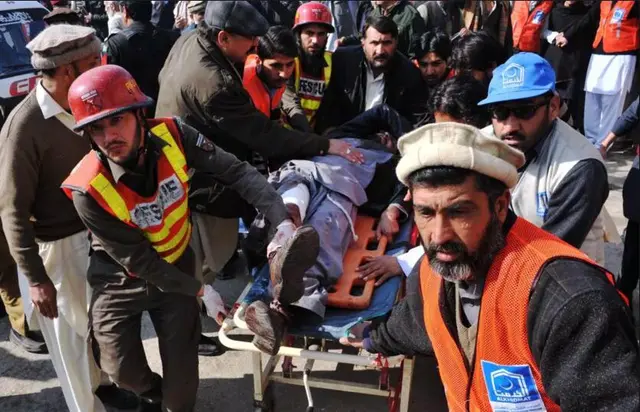The attack last week on a Pakistani university that killed more than 20 students, teachers and security guards has further divided the Taliban group as one of its commanders quickly claimed responsibility while its central spokesman denied any involvement.
Commander Omar Mansoor, who is considered the most hardliner among the Taliban commanders, appeared in a pre-recorded video along with four attackers, to claim responsibility for the Jan. 20 attack.
Hours later, however, the central spokesman for the outlawed Tehrik-e-Taliban Pakistan (TTP) group, Mohammad Khorasani, said the group had no role in the attack and that those involved will be tried in a Taliban court.
Many in Pakistan would doubt Khorasani's denial as he had approved several previous attacks that were organized by the Taliban unit led by Omar Mansoor. The attacks on the army-run school in Peshawar in December in 2014 and on a Pakistan Air Force facility in September near Peshawar were carried out by Mansoor's Taliban in Darra Adam Khel, a tribal area near Peshawar. The TTP claimed responsibility for both the attacks.
The TTP's spokesman, who routinely takes responsibility for their attacks, denying the assault on the Bacha Khan University in Charsadda district, indicates further cracks in the ranks of the Pakistani Taliban. It was the first time the Taliban's central spokesman distanced himself from an attack that was carried out by the group's known commander. This development indicates either Omar Mansoor has parted ways with the TTP or the group has lost control over some hardliner influential commanders.
The emergence of the Islamic State (IS) caused a serious blow to the Taliban, as some senior commanders have switched loyalties to the Middle Eastern outfit. Hafiz Saeed Khan, who was once a member of the TTP's central council, now leads the IS in what the group calls the "Khorasan" region that it says includes Afghanistan, Pakistan and parts of Iran. Afghan officials have said Khan survived several U.S. drone strikes targeting him in Afghanistan. The TTP's whole unit of the Bajaur tribal region later joined the IS, further weakened the group.
The TTP has already seen fractures and several commanders formed splinter groups at a time when they were uprooted from their sanctuaries in Pakistan's tribal regions, bordering Afghanistan. The Taliban group became fragmented after the death in a U.S. drone strike of its chief, Hakimullah Mehsud, in November 2013.
When Maulvi Fazalullah was appointed as the new TTP chief, two senior leaders from the South Waziristan-based Mehsud tribe, Khan Sayed alias Sajna and Sheharyar Mehsud, formed their own groups after bloody clashes that had claimed nearly 200 lives.
Last year, some senior Taliban commanders in the Mohmand tribal region, Omer Khalid Khorasani, Maulana Qasim Khorasani and Ehsanullah Ehsan, launched their own faction of the TTP called Jamaat-ul-Ahrar.
Pakistan now faces a major challenge as security officials say the TTP and other Pakistani militants now operate from the Afghan side of the border. Like some of the previous major attacks, the Pakistan army said the attack on the Bacha Khan University was controlled by a TTP commander in Afghanistan.
A day after the university attack, the army chief, General Raheel Sharif, personally spoke to the Afghan president, the chief executive and the foreign forces' commander and shared "details" with them about the attack and asked for their cooperation in locating and targeting those responsible for the heinous act and bring them to justice, according to a military spokesman.
For its part, Kabul insists it has never been its policy to shelter terrorists, and senior Afghan leaders, including Chief Executive Dr. Abdullah Abdullah who last month told a Pakistani delegation that Afghan security forces have carried out several operations targeting the TTP leader, Fazaullah, but he had survived. Now, when the Afghan leaders report the presence of TTP elements, this requires enhanced cooperation between Pakistan and Afghanistan to work together to counter the threat.
Afghanistan had also long been demanding action against the Afghan Taliban responsible for attacks in Afghanistan. The two countries' cooperation is also a key to the protracted peace process.
 简体中文
简体中文





